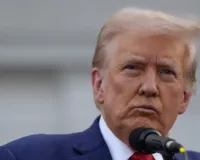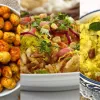India-US trade talks: New Delhi refuses to budge on dairy imports over 'non-veg milk' concern

As India and the United States engage in intensive negotiations to boost bilateral trade to $500 billion by 2030, the dairy and agriculture sectors have emerged as the most contentious issues, with India drawing a firm red line over the import of dairy products. While Washington DC is pressing New Delhi to open its dairy market, India insists on strict certification that imported milk must come from cows not fed animal-based products like meat or blood — a condition rooted in deep religious and cultural sensitivities.
The dairy dispute: A cultural and economic flashpoint
At the heart of the stalled talks is India’s insistence on ensuring that all imported dairy products meet strict veterinary certification standards. These standards mandate that cows producing milk for import should not be fed animal-derived substances such as meat, blood, or tallow. This insistence stems from India’s largely vegetarian population and the religious sanctity associated with dairy products, which form an essential part of everyday rituals.
Ajay Srivastava of the Global Trade Research Institute explained, “Imagine eating butter made from the milk of a cow that was fed meat and blood from another cow. India may never allow that.” This concern transcends mere economics, touching on faith, tradition, and dietary ethics.
Economic stakes: Protecting millions of farmers
India’s dairy sector is not only culturally significant but also a critical economic pillar. The country is the world’s largest milk producer, supporting over 80 million smallholder farmers and feeding more than 1.4 billion people. Opening the dairy sector to cheaper imports risks flooding the market and undercutting domestic producers, potentially leading to significant livelihood losses.
A senior government official told media, “There is no question of conceding on dairy. That’s a red line.” High tariffs — 30% on cheese, 40% on butter, and 60% on milk powder — currently protect the industry from foreign competition, making imports from countries like New Zealand and Australia economically unviable.
US pushback and trade barriers accusations
The US, a major global dairy exporter with $8.22 billion in exports last year, has criticised India’s certification requirements as “unnecessary trade barriers” and has urged New Delhi to grant greater market access. The US argues that India’s veterinary certification rules and tariffs unfairly restrict trade and are challenged in forums such as the World Trade Organisation (WTO).
Health and ethical concerns over animal feed
Beyond economics, the US dairy industry’s cattle feed practices have raised eyebrows in India. Reports have highlighted that US cows may be fed animal by-products, including parts from pigs, fish, chickens, and even poultry litter—a mix of feathers and droppings used as a low-cost feed additive. Such practices clash with Indian dietary norms and religious beliefs.
India’s Department of Animal Husbandry strictly mandates that imported dairy products originate from animals not fed bovine-derived feed, a policy aimed at protecting consumer sensibilities and preventing diseases like mad cow disease.
The road ahead: Finding common ground or deepening divide?
The dairy sector dispute remains one of the toughest issues in the India-US trade talks, with both sides showing little willingness to budge. For India, protecting its dairy farmers and respecting cultural values are paramount. Conversely, the US continues to push for greater access to what it sees as a lucrative and rapidly growing market.
As the two economic giants strive for a broader trade agreement, resolving the “non-veg milk” issue will be critical to overcoming this impasse. Until then, the divide over dairy imports underscores the complex interplay of trade, culture, and economic interests shaping global negotiations.
India-US trade negotiations face a major roadblock over India’s insistence on strict certification for dairy imports, rejecting products from cows fed animal-based feed due to cultural, religious, and economic reasons, while the US views these rules as trade barriers.
About The Author
Welcome to Aryan Age, an English newspaper that has been serving readers since 2011 from Delhi. With a loyal circulation of over 19,000, we are dedicated to providing our readers with the latest news and information, as well as insightful analysis and commentary that help them navigate the complex and rapidly changing world.










Comment List